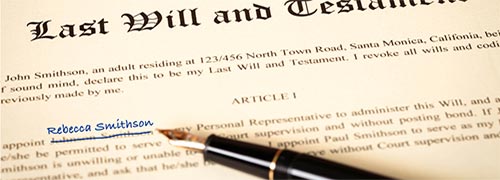Codicil to Will - How to Amend a Will
A Codicil to Will is a convenient way to amend a Will by making changes to parts of it with the effect of keeping it updated without having to redraft and formally execute a new Last Will and Testament.
It serves the same purpose as a Will, although a Codicil is usually an addendum to a Will, i.e. an annexure or schedule or supplementary document which refers to the Will it amends.

Note that it leaves the Last Will in effect, i.e. it does not revoke the original Will but it may change parts of it or make additions to it.
Will and Codicil Difference
A Codicil is legally valid in of itself. It may also serve as an alternative to a Will and in some jurisdictions there is no distinction between a Will and a Codicil.
In the context that we are discussing here, we will be using a Codicil as an addendum / amendment to delete or alter existing portions of a Will or to make provision for additional clauses.
Incidentally, you could also make use of a Codicil to give more details or instructions explaining how your bequests should be handled, to confirm a provision, to modify or ratify your funeral or burial wishes. If you follow the legal requirements, it is an additional legal way to make your wishes known from time to time.
Below is a list of our free downloadable Codicil templates, but before you rush off to draft your Codicil, do read through our legal guidelines set out below first. In a separate article we further show you step by step How to Make a Codicil so you can tailor it to your specific circumstance.
Free Codicil to Will Forms to help you draft a:
- Codicil to remove beneficiary;
- Codicil to change an executor or a guardian;
- Codicil to Add Bequests - You may wish to leave a legacy to the trust fund of your alma mater i.e. make a donation.
If you want to cancel your Will completely, you can do so in a number of ways and we will show you How to Revoke a Will.
How to Make a Codicil - Legal Requirements
Only the original testator/creator of a will can make changes to his Will, provided he has testamentary capacity (has the capacity to understand the nature and effect of making the changes) and must declare the amendments to be made of his own free will and not under duress / negative influence of someone else.
It cannot be done by any person other than the creator of the will, even if that person has a Power of Attorney.
Just to clarify the term 'legally executed' - it simply means that it was signed according to the formal procedural requirements in the testator's jurisdiction.

For example: In some jurisdictions you may need only two witnesses to a Will, whereas in another you may need three witnesses, have it notarized etc., in order for it to be declared a valid document.
Having said that, in some jurisdictions the requirements for a Codicil to Will have been made less stringent than those for a Last Will and Testament and may need only notarization by a notary public.
In the United States you can refer to the Uniform Probate Code which has been adopted by a number of states, to check the formal requirements for Wills and Codicils.
However, if you are unsure, simply follow the same executing procedure as for a Last Will and Testament.
Amendment to a Will
There may be automatic (involuntary) changes made to your Will as specified in law:
- If you marry, your Will may be automatically revoked unless your Will was made in anticipation of the marriage;
- If you divorce, in some jurisdictions your ex spouse may still inherit upon your death (or the bequest may be revoked if you die within a prescribed period of the divorce as is the law in some areas), or his/her appointment as executor or guardian may be revoked. Incidentally, in the UK, divorce will not have the effect of revoking a will but any gifts to the spouse or civil partner will fail.
There are so many variations in law! This is why attorneys mostly advise the making of a new Will, with the effect of revoking all previous testamentary documents, should there be any changes in your family circumstances.
Incidentally, a clause in any Will stating that the testator will not amend the document, will not be enforceable. It therefore follows that you do NOT need a clause reserving your right to amend your Will, since you have the power to do so in any event.
Can I Make Handwritten Changes to My Will?
In some (but not all!) jurisdictions you can correct changes in the text of your Will before signing it, especially if the changes are minor such as the change of an address or a strikethrough of space or text.
Make this amendment as clear as possible!
In this case both the testator and the witnesses must sign or initial in the margin as close as possible to the alteration and add the date that the alteration was made / signed. This could serve to prove that the changes were made according to the wishes of the testator at the time of executing the Will and as such difficult to challenge.
Can I Make Handwritten Changes to My Will After It's Been Executed?

The short (and safest) answer is no, but it depends on your jurisdiction!
You may wish to make changes at a later stage - after you've signed and had your Will witnessed - by adding handwritten interlineations or deleting sections. For example, you may want to simply write the word "void" or "cancelled" across a provision that you wish to revoke.
However!
You need to be aware that handwritten changes may have no effect or may render the entire Will invalid, depending on your jurisdiction. It is known as a holographic Codicil which is not legal everywhere.
It may be condoned (accepted for probate) by a court if it is all in your own identifiable handwriting and duly signed and witnessed - that said, not all countries / states / provinces have the same legal requirements.
Sidebar: Handwritten Wills - holographic Wills - are not legally valid in all jurisdictions. The same applies to handwritten Codicils or amendments on a Will.
You may also be creating an opportunity for someone (for example a disowned family member) to challenge your Will which will incur an unnecessary cost to the estate and delay distribution of the assets.
So do read that handwritten changes are not advisable! You must consult with an estate planning attorney to ensure any changes you wish to make on your Will complies with your legal requirements. Rather consider doing a separate and legally executed Codicil.
And
If you find yourself having to make too many amendments to your Will, it is best to draft and execute a new Last Will and Testament that clearly outlines your wishes.
Keep a copy of your Will in electronic form so you can easily review and amend it from time to time and especially when there are significant life changes e.g.:
- Death of a spouse;
- Birth of a child or grandchild;
- Marriage or divorce or annulment of marriage;
- A sudden financial windfall comes your way or you suffer a financial setback;
- Liquidation of assets bequeathed in your Will;
- Adding a legacy etc.
Why a Will is Better Than a Codicil
- A Will is easier to understand because multiple Codicils may become confusing and if there are contradictions, the latter will revoke the earlier.
- A Codicil may become separated from your Will (lost or destroyed) and not be read as one document with your Will.
- A Codicil can serve to republish an earlier Will and thereby effectively change the date of your Will. However, if your family circumstances have changed in the interim e.g. you got married, you need to verify that your newly republished Will still reflects your wishes!
It may not be a requirement to have your Codicil notarized. But if you do sign your Codicil under oath in the presence of your witnesses and a notary public, it can serve as a Self-Proving Affidavit which negates the need for witnesses to state the same facts in court under oath upon your death.
Second Codicil to Will
You can have a second Codicil to a Will, or a third or in fact as many as you wish. Your Will and all Codicils need to be kept (not stapled) together because they will be read and interpreted as one document in order to identify your intentions upon your death.
Having a number of Codicils poses the risk that they may become separated or an even bigger risk is that they may have contradictory clauses which may be difficult to interpret.
The important part is to leave very clear instructions. If there are contradictions or your intention is not clear, it may render such a Codicil invalid.
Should a dispute arise, any amendment to a Will needs to satisfy a court that it was the intention of the testator for this document to be his amendment to his Will. The court will seek to ensure expression thereof in a Codicil and it is important for a testator to comply with the formal requirements in order to create legal certainty and, with it, the validity of his document.
Testamentary Capacity Requirements

You can amend your Will at any time and as often as you wish before your death, as long as you have testamentary capacity namely:
- You are of the required legal age to make a Will;
- You understand the nature of the document e.g. you are not under the mistaken impression that you are signing another document;
- You understand the nature and extent of your estate;
- You know who your heirs are and how you want them to benefit upon your death;
- You are not mentally incapacitated due to drunkenness or the effects of drugs nor are you deemed mentally incapacitated by a medical professional;
- You were not unduly influenced by another person or under duress when you created your Will or Codicil to Will.
There are two notable exceptions though: A joint Will or an antenuptial contract containing testamentary provisions may invalidate amendments to a Will that are conflicting with these documents.
Importantly, where a surviving spouse accepts the provisions and, where relevant, the amendments to a Will, the assets will be divided as provided for in the Will. Alternatively, the surviving spouse also has the power to reject a Will with the effect that the marital regime will take precedence when deciding how to divide the deceased's estate.
I.e. Where the spouse rejects the Will, that spouse will not receive anything from the joint Will but will retain his or her half of all the assets. So in that instance the joint Will then becomes completely ineffective.
Can a Codicil be Contested?
Yes, and for any number of reasons that a last Will may be contested. Take a look at our article on Contesting a Will for more detailed information.
Rights of a Testator
Freedom of testation signifies the rights of a testator to dispose of his assets as he pleases.
He can write off debt against his estate, make bequests, simply revoke all previous Wills, appoint an executor, guardian etc. He can do this through his Will or make changes to his Will by executing a Codicil to Will whenever he wishes to do so.
Note: There are exceptions to this freedom of testation, such as a duty of maintenance and education of minor children / maintenance of a surviving spouse which cannot be avoided using a Will or Codicil to a Will as a preventative instrument. Further, if directions are too vague, unlawful or impossible to carry out they will also be deemed invalid and void ab initio (i.e. from the outset).
It is not difficult to draft a simple Codicil to Will with a view to making minor changes to your last Will, as long as you're mindful of the legal requirements in your jurisdiction.
Legally reviewed by: MD Sawyer (LLM)February 2022You are here:




